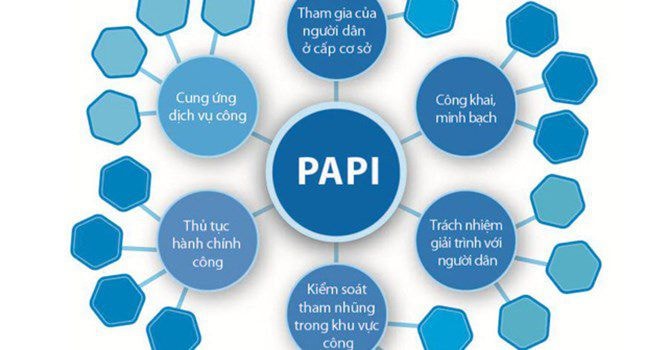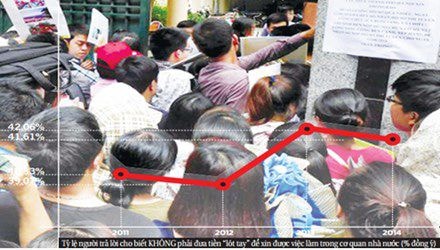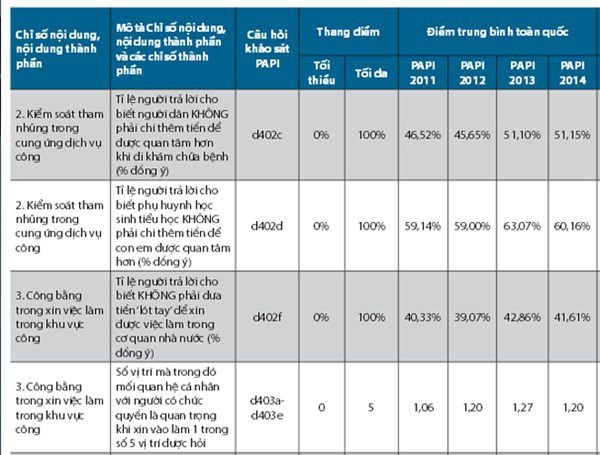PAPI Index 2014: Nearly 50% had to pay bribes to become civil servants
The Vietnam Provincial Governance and Public Administration Performance Index (PAPI) report, jointly published by the Center for Community Support and Development Studies in collaboration with the Central Committee of the Vietnam Fatherland Front and the United Nations Development Program on April 14, reflects a worrying reality: Nearly 50% have to pay bribes to become civil servants.
 |
| Illustration photo |
According to the survey results, the majority of people believe that corruption and bribery are a worrying problem in many different areas of provincial public service delivery. Paying “bribes” and relying on close relationships with people in positions of power and authority to get jobs in the public sector still seem to be a very important part for those who wish to pursue a career in the public sector.
Research findings from the PAPI survey over the past four years show the prevalence of bribery and the systematic nature of nepotism in public service recruitment. For example, in Thai Nguyen, only 12% of respondents said they did not need to pay bribes to get a job in the local public sector. In Ha Giang, according to the 2014 survey, there is no position that does not require personal connections to be recruited.
The survey also asked respondents about their experiences with bribery when using public services at hospitals and primary schools. The survey found that about 43% said they had to pay bribes to get services at district-level public hospitals. 30% of those with children in primary school reported having to pay bribes (up from 12% in 2012).
 |
| Scene of queuing up to submit application documents for the 2014 General Department of Taxation exam. |
Regarding transparency in land compensation, the survey found that the majority of respondents said they or their relatives who lost land received compensation. However, more than one-fifth of them said they had received no compensation at all. At the same time, only 36% of those who lost land in the past year said they had received adequate compensation.
Talking to reporters about the PAPI Report, Mr. Dang Ngoc Dinh, Director of the Center for Development Studies and Community Support, said that the above results reflect the reality that "corruption is still widespread in society".
“This is extremely worrying, especially in the field of education. Because education is the environment that trains the future generations of the country. Now that corruption and bribery are so rampant, it will certainly affect the thinking of the children in the future,” Mr. Dinh worried.
Similarly, regarding the situation of corruption and bribery to become a civil servant, Mr. Dinh said that it reflects the reality that "state units" still have great appeal to people even though the salary is quite low.
“Low salaries are certainly not enough to meet their needs. Therefore, talented people will not accept to spend money to run into the government. Therefore, sometimes people with average abilities enter the government. They “run” there because they see a stable job, opportunities for promotion, and even the opportunity to “get back” the money they “bribed” before,” Mr. Dinh said.
 |
| Survey results on bribery and corruption in PAPI report. |
People are increasingly tolerant of corruption.
According to the PAPI Report, compared to the analysis results of 2011, the level of improvement in corruption control efficiency at the provincial level has shown signs of slowing down. The majority of people when asked assessed that "there has been no progress in the content index of corruption control".
The determination to fight corruption of provincial authorities in 2014 has remained almost unchanged compared to previous years. In particular, Hanoi and Hai Phong are still among the lowest-scoring groups in the anti-corruption control index. On the contrary, the provinces of Soc Trang, Long An, Tien Giang, Binh Duong, Binh Dinh, and Vinh Long are consistently ranked in the top group with high public ratings for anti-corruption.
The survey results also show that, nationwide, only about 40% of respondents said that local authorities seriously handle corruption cases that occur in their localities. In particular, only a very small percentage (about 3%) of people who have been asked for bribes by officials or civil servants dare to report such acts.
In many places, 100% of people surveyed said that after being asked for bribes by People's Committee officials or commune or ward police, they did not report those acts. The reasons explained were that reporting would not bring any benefits, the reporting procedures were too cumbersome, or they were afraid of being persecuted, retaliated against, or did not know how to report.
“The ability to tolerate the extortion of officials and civil servants among the people seems to be increasing over time,” the report stated. The people’s tolerance of corruption is also shown by the fact that they are increasingly willing to pay money and only report it when they are “extorted” for an amount of more than 8 million VND (in 2011 it was 5.5 million).
Meanwhile, according to the anti-corruption law, accepting bribes of 2 million VND or more can be prosecuted. The survey results also show that people in Lao Cai are assessed to have a very high tolerance for corruption, because the average value when they start to denounce the extortion of local government officials is from 16.82 million VND.
Based on the above facts, the report suggests that people should be more proactive in reporting acts of harassment and extortion by civil servants and public employees to help reduce corruption and harassment. In addition, Mr. Dinh also believes that the state needs to develop mechanisms and policies to encourage and better protect people when they come forward to report corruption.
| The people's tolerance for corruption by officials and civil servants seems to be increasing over time," the report stated. The people's tolerance for corruption is also shown by the fact that they are increasingly willing to pay money and only report it when they are "extorted" for an amount of more than VND8 million (in 2011 it was VND5.5 million). |
According to TP
